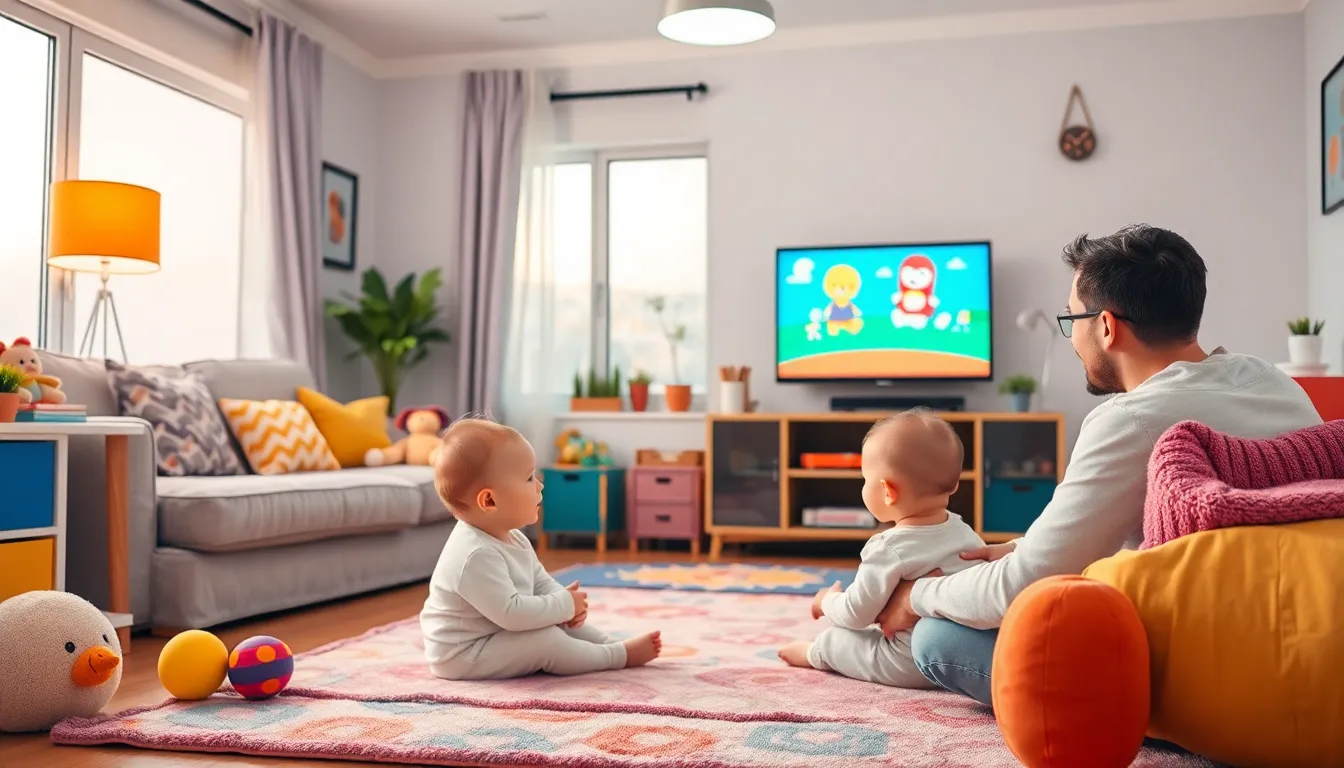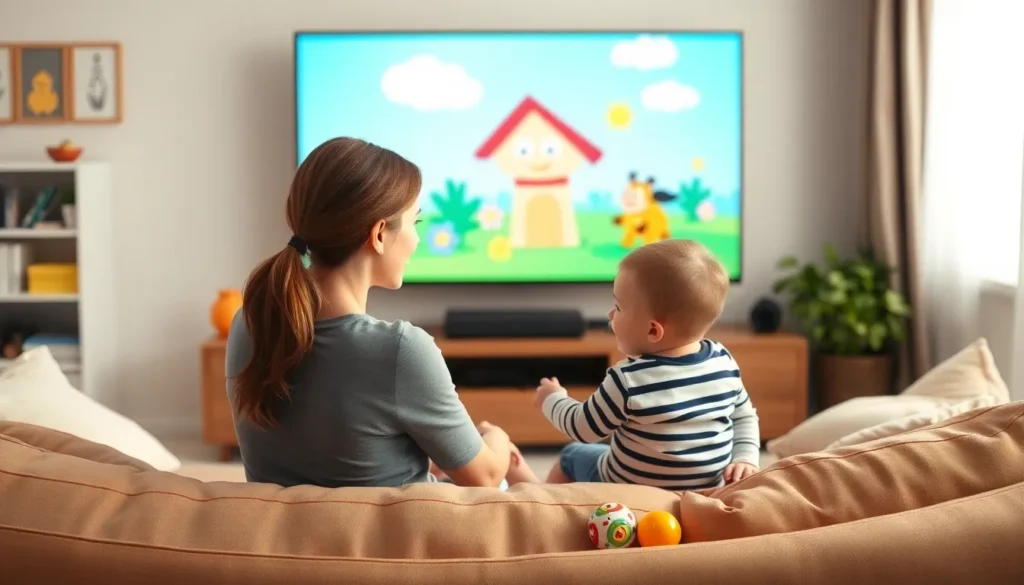In today’s world, the battle for a baby’s attention often goes head-to-head with the allure of the glowing screen. Parents might find themselves wondering if that animated character on TV is a worthy babysitter or just a sneaky distraction. After all, who wouldn’t want their little one giggling at colorful cartoons while they sneak in a moment of peace?
Baby Watching TV
Babies often find themselves drawn to television screens, yet this engagement raises significant concerns. Understanding the implications of screen time helps parents make informed choices.
Developmental Concerns
Excessive TV watching can impair a baby’s physical and social development. Studies indicate that children who watch more than two hours of television a day may exhibit delays in language skills. Interaction with caregivers fosters communication, but screen time often replaces face-to-face interaction. Experts recommend limiting screen time for children under 18 months, as it might hinder crucial developmental milestones. Engaging in active play and reading promotes developmental growth more effectively than passive media consumption.
Cognitive Effects
Cognitive development also suffers through prolonged exposure to television. Research shows that babies exposed to screens may display diminished attention spans and learning challenges. Animated shows often lack the depth necessary for complex thinking, which negatively impacts a child’s problem-solving abilities. Attention to vibrant visuals distracts from meaningful learning experiences. Active play stimulates cognitive growth much more than passive viewing. Parents are advised to prioritize interactive activities that promote critical thinking and creativity over screen time.
Recommended TV Content for Babies

Selecting appropriate TV content for babies involves considering educational value and age-appropriateness. Parents prioritize programs that foster learning while keeping babies engaged.
Educational Programs
Educational programs offer valuable benefits for early development. Shows that use basic vocabulary help enrich language skills, making them valuable resources. Programs like “Sesame Street” and “Bluey” incorporate interactive elements that encourage participation. Engaging animations accompanied by music can also enhance auditory learning. These types of content serve as excellent supplements to direct interactions with caregivers.
Age-Appropriate Shows
Choosing age-appropriate shows ensures content aligns with developmental needs. Babies under 18 months benefit from simple stories and bright visuals. Programs like “Baby Einstein” or “Mister Rogers’ Neighborhood” introduce essential concepts in an accessible manner. Each episode should foster curiosity and exploration, sparking interest in the world. Parents can find peace in knowing these shows support cognitive growth, reducing the risk of overstimulation from more complex visuals.
Screen Time Guidelines for Infants
Screen time poses challenges for infants and parents alike. Experts recommend a cautious approach to screen time for young children.
American Academy of Pediatrics Recommendations
The American Academy of Pediatrics (AAP) recommends no screen time for children under 18 months, except for video chatting. This guideline aims to promote healthy development by minimizing exposure to screens. For children aged 18 to 24 months, parents should choose high-quality programming to watch together. Parents must also ensure viewing content is educational, interactive, and age-appropriate. Observing these guidelines supports essential language and social skills as children interact with caregivers instead of screens.
Balancing Screen Time with Other Activities
Engaging infants in a variety of activities remains crucial for their development. Prioritizing interactive play, reading, and outdoor exploration enriches their experiences. Balancing screen time with hands-on, stimulating activities strengthens language and cognitive skills. Alternatives like playing with toys, singing, and socializing with family sustain healthy growth. Integrating structured activities into a daily routine limits excessive screen exposure while maximizing experiential learning. Parents should strive to create an environment where diverse activities foster critical thinking and creativity, further promoting development.
Tips for Parents on Managing Screen Time
Managing screen time is crucial for promoting healthy development in babies. Parents can use effective strategies to ensure their little ones benefit from quality interaction rather than excessive passive viewing.
Setting Limits
Setting screen time limits helps cultivate better habits. The American Academy of Pediatrics recommends no screen time for children under 18 months, except for video chatting. For children aged 18 to 24 months, parents should opt for high-quality programming. Scheduling specific viewing times can also prevent excessive exposure. Active participation in choosing shows can make this process enjoyable. By discussing limits beforehand, parents can foster a better understanding of the importance of balance.
Encouraging Interactive Viewing
Encouraging interactive viewing promotes engagement and learning. Parents should watch programs together to enhance comprehension and participation. Asking questions during the show stimulates critical thinking. Programs like “Sesame Street” and “Bluey” integrate interactive elements that keep babies engaged. Discussing characters and themes encourages curiosity and dialogue. Fostering an environment where screen time includes interaction helps babies connect visuals to real-life experiences.
Conclusion
Navigating screen time for babies is a delicate balance. Parents must weigh the allure of colorful cartoons against the potential drawbacks of excessive viewing. By prioritizing quality content and interactive experiences, they can create a nurturing environment that supports healthy development.
It’s essential to take the American Academy of Pediatrics’ guidelines to heart, ensuring that screen time is limited and purposeful. Engaging with educational programs and participating in viewing can foster critical thinking and language skills. Ultimately, the goal is to enrich a child’s learning experience while promoting active play and exploration. By making informed choices, parents can help their little ones thrive in a screen-filled world.

